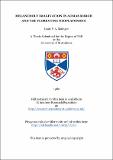Melancholy imagination in Ausias March and the Florentine Neoplatonists
Abstract
This thesis focuses primarily on the work of the Valencian poet, Ausias March (1398 - 1459), who was revered by the first two generations of Petrarquistas in Golden Age Spain, and in particular by Juan Boscán and Garcilaso de la Vega. It has long been contended that the introduction of Ficinian Neoplatonism in Spain by Boscán's translation of Il Cortegiano, and Garcilaso's assimilation of Bembo's Petrarchism, represents a radical shift in sensibility, unprecedented in the Iberian peninsula. The object of this thesis is to demonstrate that because Ausias March is a Lullian poet who manifests an evangelical-Platonic sensibility, and is not a "troubadour attardé" as Amédée Pagès thought, the introduction of the Italianate fashion by Boscán and Garcilaso is not a radical departure from their earlier allegiance, but a development. The poetry of Ausias March is remarkable for its introspection. Consequently, the interpretation of his work must begin with an analysis of his use of the theory of imagination, which he inherited through the literary influence of the Chartrians and Victorines of the twelfth century, and, in particular, from Hughes de Saint Victor. The importance of introspection and imagination naturally entails the question of the extremes of melancholy, as it is understood in the mediaeval tradition of Aristotle's Problem XXX, i. After a survey of the role of melancholy imagination in Ausias March's poetry, the function of these two closely related concepts is analysed in Ficino's Commentarium in Convivium , Hebreo's Dialoghi, Bembo's Gli Asolani, and Castiglione's Il Cortegiano. This enables one to determine that the Florentine theory of love is not insulated from passion, as many literary critics imply. The dialectical relation of natural reason to Augustinian right reason evinces the extremes of imagination and melancholy, as either lunacy or divine rapture. These elements of Florentine Neoplatonism reveal a deep concern for the difficult relation of the body to the soul, and, ultimately, a conscious search for ascesis. These elements, which are common to Ausias March and the Florentine Neoplatonists, are an expression of the Augustinian doctrine of Charity. The common factor between Ausias March and the Florentines is the pseudo-Dionysian - Erigenian concept of beauty. The latter is fundamental to what M. D. Chenu has defined as the secular evangelical current in Europe. It is a sensibility based on a consciousness of the all-pervasive presence of grace in nature, which is articulated in the symbolic mentality of Christian Platonists. This aspect of Ausias March' Work is central to Chapter V. In order to avoid creating the impression that this interpretation of Ausias March's poetry is anachronical this chapter studies the significance of an important segment of this poet's imagery. This serves to contrast Ausias March's use of the pseudo- Dionysian - Erigenian concept of beauty and his consequent handling of the concepts of melancholy and imagination to that used by Andreas Capellanus. Finally, this analysis illustrates Ausias March's predominantly symbolic mentality, as well as his exceptional use of medical theory which distinguishes him from the vast majority of Spanish cancionero poets, and emphasizes his many points of affinity with the Florentine Neoplatonists.
Type
Thesis, PhD Doctor of Philosophy
Collections
Items in the St Andrews Research Repository are protected by copyright, with all rights reserved, unless otherwise indicated.

